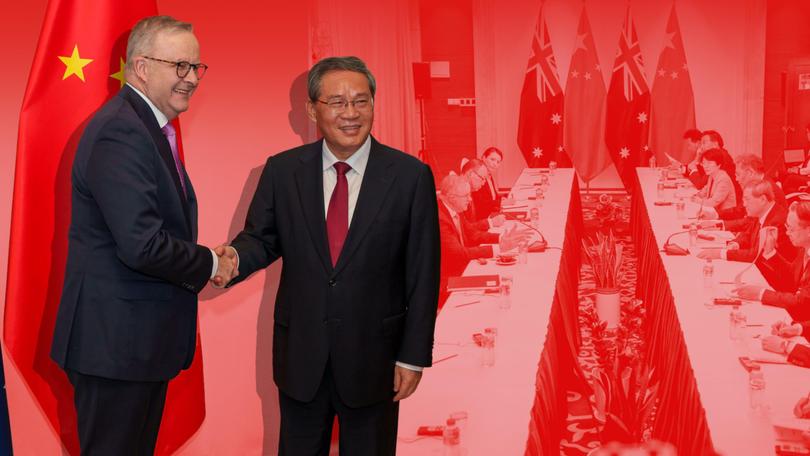Lobsters back on Chinese menu after Anthony Albanese confirms deal to lift trade embargo
China will lift its ban on Australian live lobster exports by the end of the year, Prime Minister Anthony Albanese has confirmed after meeting Chinese Premier Li Qiang.

Live lobster imports will be allowed back into China before the end of the year after Beijing agreed to drop the last of its major trade sanctions on Australia.
In a diplomatic win for Anthony Albanese, the Prime Minister announced the long-awaited agreement after talks with Chinese Premier Li Qiang on the sidelines of the Association of Southeast Asian Nations (ASEAN) summit in Laos on Thursday.
Mr Albanese also used the face-to-face talks to raise Australia’s list of grievances with China, including its military aggression in the South China Sea, recent test-fire of an intercontinental missile into the Pacific Ocean and ongoing detention of Australian writer Yang Hengjun.
Sign up to The Nightly's newsletters.
Get the first look at the digital newspaper, curated daily stories and breaking headlines delivered to your inbox.
By continuing you agree to our Terms and Privacy Policy.“Australia has a vision of a peaceful, stable and prosperous world where sovereignty is respected and countries abide by international law,” Mr Albanese told Mr Li.
A technical dispute related to the testing of Australia live lobsters has barred exports into China, hitting WA crayfish producers particularly hard over the past four years.
The timeline for the resumption of the trade — which was worth $700 million per year before the ban — means lobsters will be back on dinner and restaurant tables in China in time for Chinese New Year celebrations.
It will save 3000 jobs, including 2000 in WA alone, according to the Federal Government.
“This will be welcomed by the people engaged in the live lobster industry in places like Geraldton and South Australia and Tasmania and so many parts of, particularly, regional Australia,” Mr Albanese said.
The rock lobster ban was the last of China’s remaining COVID-era trade sanctions on Australia after restrictions on coal, wine, barley, timber and cotton were gradually lifted amid a thawing in diplomatic tensions between Beijing and Canberra.
The sanctions were estimated to have cost more than $20 billion per year.
Describing the economic impact of re-starting the lobster trade as “substantial”, Mr Albanese said he anticipated exports of coal, wine and seafood to China would grow to exceed the levels prior to the trade sanctions.
Premier Roger Cook was thrilled that WA’s lobsters, “renowned for their sweet, rich taste and succulent firm flesh”, would be back on the tables of high-end restaurants and hotels.
“WA rock lobster is the best in the world, and I’m pleased to see that it will soon be back on the menu at restaurants across China,” he said.
The State Government supported the industry through the trade blockage by allowing it to increase local sales and help to find other markets, and Mr Cook said the resumption of trade into China would build on this success.
Mr Albanese heralded the agreement as validation of his approach to stabilising relations with China.
“We have continued to stabilise the relationship without compromising on any of Australia’s national interests,” he said.
Earlier, Mr Albanese told Mr Li that Australia wants a “peaceful, stable region” where countries abide by international law amid heightened tensions over Beijing’s behaviour in the South China Sea.
Mr Albanese said “frank exchanges” on areas of disagreement would help strengthen ties between Australia and China.
“Dialogue is crucial and peace and stability take work,” Mr Albanese said.
In his opening remarks, Mr Li described Mr Albanese as an “old friend” and said it was “gratifying” that relations between Australia and China “continue to move forward in a positive direction”.
“I can feel clearly, that people of both countries are generally supportive of the improvement of China-Australia relations, and it also gives me greater confidence in sustaining our cooperation and achieving winning outcomes at a higher level,” he said.
Mr Albanese also announced WA senator Sue Lines would lead a bipartisan parliamentary delegation to China on Friday — the first such visit in five years.
Labor’s Sam Lim, who represents Tangney, Carina Garland and Jerome Laxale, Liberals Karen Andrews and Keith Wolahan and independent Zali Steggall make up the travelling party.
They will hold high-level meeting including in the National People’s Congress, and visit historic landmarks in China.
On Thursday, Mr Albanese also held talks with Canadian Prime Minister Justin Trudeau and New Zealand Prime Minister Christopher Luxon.
Mr Albanese said the countries had “shared values”, noting all three had signed joint statements calling for a de-escalation in the Middle East conflict and the return of the Israeli hostages taken by Hamas during the October 7 massacre.
In a speech later on Thursday, Mr Albanese was expected to tell South-East Asian leaders that Australia would continue to speak up about China’s “destabilising behaviour” in the South China Sea.
Mr Albanese also expressed Australia’s deep concerns with the “worsening political, security and humanitarian situation” in Myanmar, which has been under military rule since its democratically elected government was overthrown in 2021.
The Prime Minister lamented that seven months after Australia and ASEAN leaders gathered in Melbourne and expressed a shared view on the “dire situation” in Gaza, the Middle East conflict had escalated.
